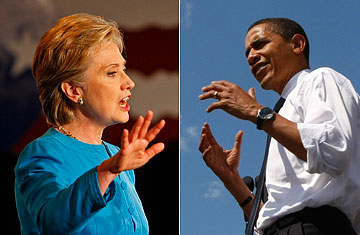
Left: Sen. Hillary Clinton at a rally in San Juan, Puerto Rico, on June 1; Right: Senator Barack Obama speaks in Mitchell, South Dakota, on June 1
After 26 debates, 48 states and a mere $435 million raised between them, is the end of Clinton vs. Obama upon us?
If you believe in the power of numbers, it really, actually, finally is. Barack Obama has a roughly 176-delegate lead and is less than 60 delegates short of clinching the nomination, with most of the final 31 pledged delegates set to be divvied up by Tuesday night in Montana and South Dakota. A plug of superdelegates is expected to jump on his bandwagon shortly after those primaries, if not before. Then, both sides expect, he'd have the 2,118 delegates needed to put the nomination in is pocket.
But the Hillary Clinton team prefers—for a few more days, at least—to do the math differently. With her win in Puerto Rico and a net gain of 24 delegates over the weekend in party rules meetings, Clinton is on the verge of eeking out a tiny moral victory: unless a torrent of superdelegates emerges in the next 48 hours, she will have deprived Obama from clinching the nomination before the official end of the primary season.
Now, in whatever time she has left, she will woo the superdelegates who remain by convincing them with her own numbers that she's the winner of the popular vote.
But to call her calculations "math" is a reach: Clinton's popular vote claim counts all the primary vote totals but ignores the 15 party caucuses that attracted thousands of participants in every state, and which Obama dominated. That's a revealing way to sum up the five-month long election—and it will be intriguing to see how long Clinton chooses to cling to that line.
Instead, she may try another argument—that by making the race so close, she's earned the right to be Obama's running mate. No sooner had this weekend's battles of Michigan, Florida and Puerto Rico come to an end than whispers began to trickle in once more that Clinton will continue to try to pile up marginal delegates to compel Obama to consider her for the number two spot. "There are a bunch of women out there," said one member of her team, "who won't vote for him otherwise."
It is true that between 25 and 45 percent of Democrats who voted for Clinton have told pollsters that they would vote for John McCain in the fall rather than Obama, but is that threat credible?
There is considerable evidence that some of those voters are letting their emotions do the talking—and following in a long tradition by doing so. According to ABC News' polling unit, in the spring 1992, only 63% of Democrats who voted for someone other than Bill Clinton in the primaries that year said they would vote for Clinton over George H. W. Bush that fall. In 1996, 66% of Republicans who voted for someone other than Bob Dole in the G.O.P. primary said they would support Dole against Clinton that fall. Al Gore suffered the same apparent dropout problem; only 64% of Democrats who voted for his rivals during the primary said they would be there for Gore in the fall.
The numbers are remarkably similar for Republicans and Democrats, and there are a number of campaign veterans in both parties who believe that rumors of a hefty Democratic dropout are overheated. "People say these things in the heat of a primary," said a midwestern Republican consultant. "By the fall, they have found other things to be angry about. And they come home." This week, as Democrats try to end their civil war and prepare for a race against a maverick Republican, they can only hope that the home they come back to is united quickly.